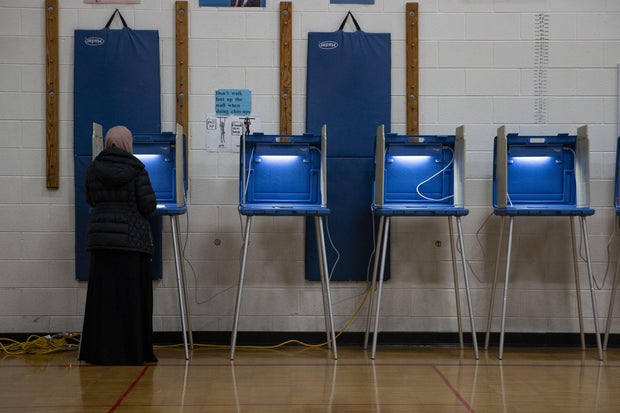Washington — CBS News projected President Biden and former President Donald Trump had easy victories in Michigan’s Democratic and Republican primaries on Tuesday, leaving little question about who will secure the party’s backing heading into the general election in November. But turnout was lower than previous contests, amid concerns about voter apathy in the key battleground state.
How many people voted in the Michigan primary for 2024?
More than 1.8 million Michiganders voted in the 2024 Democratic and Republican primary, making up around 22% of registered voters statewide. In the Republican primary, about 1.1 million people voted, while in the less competitive Democratic primary, around 740,000 cast their vote as of results tallied Wednesday morning.
A significant portion of the vote seemed to come from early voting in the state, as the Secretary of State announced on Monday ahead of the primary that more than one million Michigan voters had already cast their ballots.
“It’s inspiring to see Michigan citizens active and engaged in this Presidential Primary,” Michigan Secretary of State Jocelyn Benson said in a statement Monday. She noted Michigan voters had turned out in record numbers to cast absentee ballots and voting at an early voting site.
How do voter turnout numbers compare to previous Michigan primaries?
Turnout for this year’s primaries fell below records set in recent contents. In 2020, more than 2.3 million people voted in the primary, while in 2016, nearly 2.6 million did the same. But this year surpassed earlier primaries, like in 2012, when around 1.2 million people voted, along with nearly 1.5 million in 2008 and nearly 1.4 million in 2000, according to data from the Michigan Department of State.
How many delegates did each candidate get in Michigan?
There were 117 delegates up for grabs on the Democratic side in Michigan, of which Mr. Biden was expected to pick up at least 111. Although the president didn’t have a significant challenger, an effort launched by Arab and Muslim American to vote “uncommitted” in the primary in protest of his handling of the Israel-Hamas war drew more than 100,000 voters. If “uncommitted” wins 15% of the vote, then delegates who are not bound to any candidate could attend the convention.
On the Republican side, Michigan will award only 16 of their 55 delegates based on the results of Tuesday’s primary, while the rest will be allocated based on the district caucuses results on Saturday.

